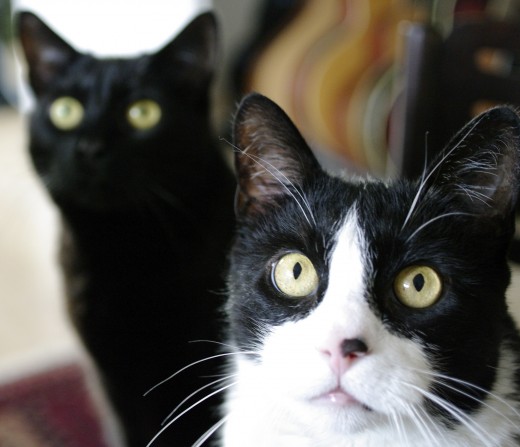Relationship Issues: Compatible Personalities and the Pseudo-Extrovert
An Observation by Cupid Valentino
You must understand that Cupid has never been one for making attempts at discouraging the pursuit of love. Cupid loves love, and love loves Cupid (or rather is Cupid, depending on the source). However, the man behind the passion must take it upon himself to warn those who undertake this complicated process that it is important that one not mislead oneself into developing any false conceptions about romance.
Cupid has noticed that a great number of relationships (especially those of the romantic persuasion) most often fail due to a lack of understanding on a personal level. Do not misunderstand this to mean that couples (or would-be couples) do not take the time to get to know each other (although that is often the case, too), but rather consider it as the flaw of people not having full knowledge of themselves. A gentleman with a lot of sense once said the following:

“To know oneself and ones objective will not lead to defeat in a hundred engagements. To know oneself and not know ones objective will sometimes lead to victory and sometimes lead to defeat. And lastly, to know neither oneself nor ones objective will invariably lead to defeat in every engagement.”
It is often said (and in some cases rightly so) that most women do not know what they want when it comes to a romantic relationship. However, if you will afford Cupid the opportunity to meddle with convention, he would like to revise the previous statement. Cupid believes that a great deal of women know exactly what they want. The problem comes when one finally realizes that what women want is not necessarily what they’re attracted to.
Cupid will now point out a certain phenomenon which has come to his attention. Follow along as Cupid explores what he calls “The Fallacy of the Pseudo-Extrovert.”
Stay focused.

As always, keep in mind that Cupid is not a philosopher. He is also not a psychologist. He does not presume to count anything as fact but merely states his opinions based on his own observations and experiences.



Introverts, Extroverts, and Things in Between
The two extremes of the personality/behavioral spectrum have conveniently been labeled, by the people who study such things, as “introverts” and “extroverts.” On this particular spectrum, very few people exist at either extreme or in a position which we will call the “true.” The “true” introverts and the “true” extroverts are the only personalities which are truly predictable and, for better or worse, susceptible to stereotyping. It is in the murky waters between the extremes where we find the subject of this observation. This individual is a certain chameleon-like character which we will call the “pseudo-extrovert.”
The Profile
Realistically, the pseudo-extrovert is in most instances an introvert who is discontent with being an introvert and wants others to see her in a more thrilling capacity. The pseudo-extrovert, however, needs to be in the company of someone who is so blatantly introverted that any outgoing action on her part (often exhibited as being awkwardly hyper) will appear exaggerated and, therefore, extroverted by comparison. This is why the pseudo-extrovert is usually best friends with a true introvert (either male or female).
What prevents the pseudo-extrovert from achieving a complete separation from the docile extreme can be credited to an inherent dependency on genuine person-to-person bonding (affectionately referred to as a “real connection”). The true introvert can provide this type of interaction. In most cases, however, true introverts can only provide this type of exchange in the form of one-on-one interaction for the simple reason that they do not hold large group activities to the same high value as the pseudo-extrovert.
Coincidentally, this tendency to be closed off is the main cause of conflict between the pseudo-extrovert and the true extrovert love interest. Most true extroverts know no loyalty higher than that which promotes a personal agenda. This means that the true extrovert will only associate with the pseudo as long as she maintains her false appearance. However, as most people with experience can attest, the charade can only be maintained for so long before certain habitual, introverted tendencies emerge.
Habits
Because of their independent nature, the true introvert and the true extrovert are more prone to going off and doing their own thing. The true introvert will usually prefer activities which do not necessitate two people, such as going to the movies. This will often not meet the needs of the pseudo-extrovert, who would much rather attend a party with the true extrovert.
Pseudo-extroverts, however, have a greater tendency to be inactive unless provoked by a personality more strongly extroverted than that which they have adopted for themselves. Whereas a true extrovert will venture out on his own if the activity promotes personal fulfillment, pseudo-extroverts seek some sort of companionship at every turn and will even go so far as to neglect the activities with which they are comfortable if someone else refuses to go along with them.
It is important to note that these “comfortable activities” will also serve as a crutch for the pseudo-extrovert. In some cases, the activities become an area of expertise due to the fact that the pseudo-extrovert will become reliant upon them for social purposes with her “less exciting” friends until the aforementioned “stronger personality” introduces her to something new. She will then tire out the newer option in a similar fashion. This cycle will eventually produce a feeling of boredom for the true extrovert because the pseudo-extrovert will always suggest this same activity when no other alternative is offered.

On the intimate side, there is usually an intense physical attraction which is stronger for the pseudo-extrovert because she is actually dependent upon her partner more so than he is to her. These feelings often replace the more casual experiences previously shared with the true introvert. Eventually (usually following a long-past-midnight phone conversation or a highly anticipated make-out session), the pseudo-extrovert will label her attraction to the true extrovert as the ever-elusive “real connection.” Though equally exchanged at first due to an initial infatuation on the part of the true extrovert, the feelings soon subside as the true extrovert slowly begins to shift his ever-changing ambitions.

The Usual Outcome
Unaware of the declining state of her relationship, a premature sense of victory and accomplishment settles in with the pseudo-extrovert, and she will begin to neglect the true introvert to the point of almost destroying their friendship. This often proves to be the pseudo-extrovert’s fatal mistake because, by eliminating the basis of comparison which made her seem extroverted in the first place, she has inadvertently opened herself up to direct scrutiny by the true extrovert. The true extrovert will inevitably, by this time, have become increasingly aware of the individual’s falsities and will now tolerate as opposed to enjoy the pseudo-extrovert’s company. Despite desperate attempts to maintain her façade (sexual compromises, failed challenges aimed at emasculating her partner, etc.), the pseudo-extrovert is usually abandoned by the true extrovert.
At this point, the forsaken pseudo-extrovert will return to the true introvert, who, because of an ability to sympathize with the intricate nature of the psyche, will cater to the emotional needs of the hurt friend. From this position the cycle continues, often accompanied by a vow to swear off the pursuit of any further relationships. This vow, however, never lasts very long.
Concerns
Those looking for flaws in Cupid’s argument may note that there are varying degrees of extroverts, some of whom may fit the description of what he has been calling the pseudo-extrovert. These may be people who seek out greater ideals as embodied through “superior” people who can help them reach the same level.
Though a true extrovert may see another as having a higher level of expertise, his intention is never to dwell in one area for too long. Other extroverts serve as companions, not as supports. There remains a difference. A companion, in the case of a true extrovert, stands side by side with him in equal strength, as opposed to being a support that, if removed, causes him to fall or to be unable to progress. A true extrovert, also, does not readily seek someone who needs to be supported.
The pseudo-extrovert, unable to recognize this, will recklessly change her life to better suit the true extrovert’s mood. Remember, the true extrovert is never satisfied with being complacent, and this, unfortunately, equates to the absence of the security and stability that the pseudo-extrovert, in denial of her own nature as an introvert, truly needs. In other words, the pseudo-extrovert sees an ideal and tries to hold onto it, while a true extrovert sees an ideal and tries to surpass it.
Final Thoughts
Cupid sympathizes with the plight of the pseudo-extrovert in that it is almost impossible for her to find lasting romance with this type of mindset. The pseudo-extrovert finds the true introvert to be too boring, and the true extrovert finds the pseudo-extrovert to be an even more intolerable dullard. Here you may ask, “But Cupid, why doesn’t the pseudo-extrovert just find another pseudo-extrovert? If they could find someone with the same interests, wouldn’t they be happy?” Cupid is glad you made that suggestion. It shows you haven’t been listening, which gives Cupid an excuse to continue talking.

The answer to this question is simple. It is because the pseudo-extrovert depends on someone with a stronger personality in order to become active. Two pseudo-extroverts would constantly be waiting on the other to make a move that will never happen, thereby resulting in both being stagnant and in the position they have convinced themselves is where they don’t want to be. Pseudo-extroverts are attracted to independently active people (or at least those they perceive to be independently active). Hence, pseudo-extroverts rarely notice each other because they are always looking away toward someone else. For how can one notice ones complement if one cannot notice oneself?








